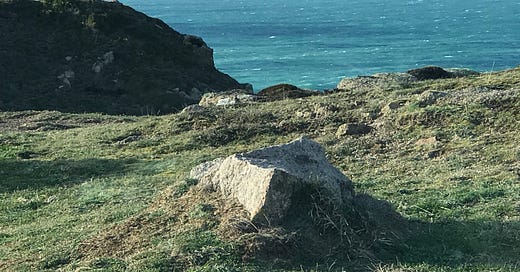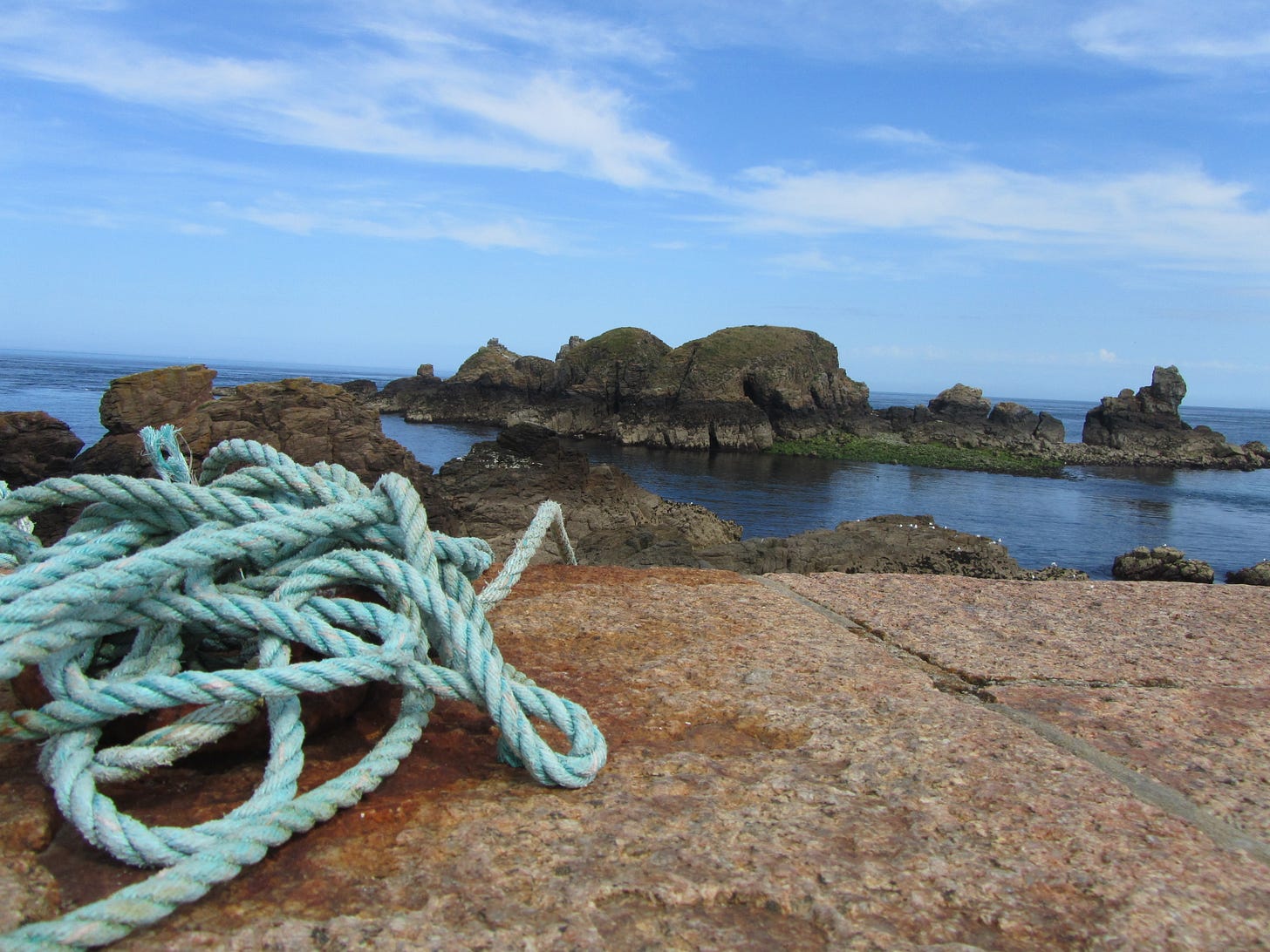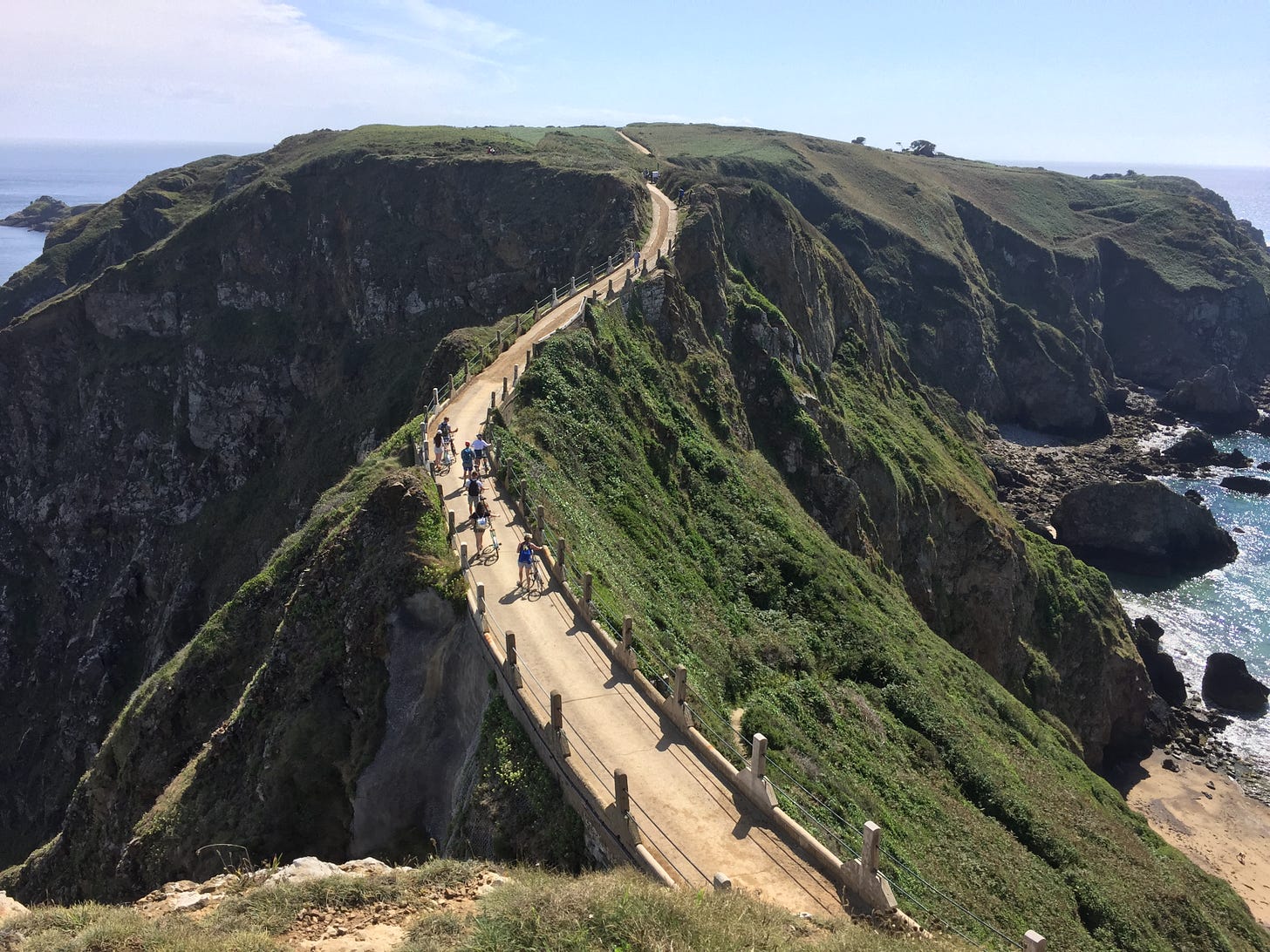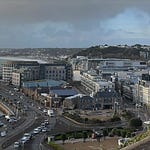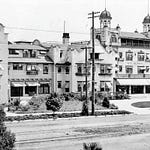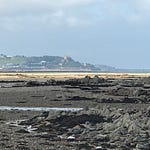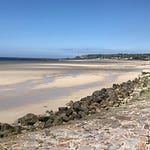Welcome to the History Islands. This is the story of a bold expedition that set out to claim a desolate wilderness and transform it within a generation. The empty place they settled was Sark - the cliffs looming on the northern horizon, so close yet abandoned to the elements. One man was determined to reverse the tide of history, and reclaim the lost island. Enjoy this month’s episode. ~ Paul Darroch
Helier de Carteret
St Ouen’s Manor
Winter 1564
I have lived my whole life brooding in its shadow. As a child, I would gaze out to sea, from my family’s ancestral lands of St Ouen. I would stand high up in the tower at Grosnez, where the cliffs collapse like grey ash into the sea. The old castle keep is falling to ruin, but a brazier still burns there day and night to warn off foreign ships.
Looking north, Sark dominated the far horizon, like a promise or a warning. Behind its sheer cliffs, it always seemed fertile and green enough. Yet that great wilderness was empty of human souls. No feet walked on that high plateau any longer; no forges burned, and no mills turned. The land had gone to seed; they said fields had swallowed up the roadways, and the monastery had fallen betwixt thorns and brambles.
Like the moon shining in the winter sky, Sark lay empty and bright, so tantalisingly close that a man might simply stretch out his arm and reach it. Yet it was cleaved from us by a fierce channel, bristling with a fringe of razor reefs. Who would cross that great gulf between us?
We grew up on the legends of Saint Magloire, who slew a red dragon in Jersey, and then struck north to build a monastery in Sark. We heard tell of the golden days of the past, when Sark nestled under the wing of the Warden of the Isles, and a pretty watermill ground corn for bread. Then the four horsemen of the apocalypse fell upon us; endless wars, the terror of plague, the failed harvests at summer’s end, and the harrowing of the French raiders.
When the Black Death ravaged these Isles, and the winters turned fierce and full of ice, Sark was abandoned. It remained a sentinel on the northern horizon, a watchman at sunset. Like the mysterious stone circles that guard our parish, I had a strange sense that it was watching and waiting for us.
Kings and queens fell, and the wheel of fortune turned. Religious passions swept the world, and my uncle, the Bailiff of Jersey, was one of the foremost advocates of the reformed faith. He only wished, he often told me, to strip away the accretions of the centuries and return to the simplicity of an earlier age. He was determined, he said, to return ad fontem – to the source.
And I too wished to make my way back to a place that had been forgotten. Sark loomed in the night, a shadow under a carpet of stars, abandoned to the rabbits and rainstorms. It glowered at us from across the sea-channel, a herald of our frailty, a witness to our decline. My ancestors had marched with the Conqueror, and now we could scarcely defend our own backyard.
I felt a burning, fierce determination that I would be the man to restore the fortunes of my house and my Island. I would strike north and reclaim that which had been lost for too long. It was time for Sark to return to the world of men.
They say this is an age of discovery – wilderness everywhere is being tamed, and the vastness of the New World is opening up its riches. Beyond the Pillars of Hercules, men have found and plundered cities of gold. New territories are falling like fruit into the courts of Europe. The time for my project is ripe.
Closer to home, the French have been harrying at our heels, as wars of religion tear Europe apart and England embroils itself in the fray. Rouen fell in the bitter siege of 1562; the threat is nearing our shores. Invasion is our secret dread, lurking at the pit of every stomach, and we in Jersey are fearfully exposed to the north.
So, I made my bold proposal to the Crown. I dared to claim the fief of Sark, but I would gladly shoulder the burden alongside the boon. I would bind myself by oath to establish a permanent settlement on the Island, and to defend it at my own cost. At a stroke, I had taken a thorny and perplexing problem from Guernsey’s grasp and made it my very own. As a final sweetener, I also agreed to pay fifty sols tournois every year into the Crown Receiver of Guernsey’s velvet-lined pockets.
We made first landfall in the summer of 1564. Our boat set off north, past the three vicious rocks of the Pierre de Lecq upon which so many ships have foundered. Then we drifted into the shadow of those giant and desolate cliffs. Sark, we were reminded, is a curious creature; its southernmost head hangs only by the thinnest of necks, like a swan, to the main body of the Island.
As we steered our craft north, we noted that Sark has no harbours, no natural coves or landing places. After scouting the shore, sculling through a moonscape of rocks and gleaming caves, we eventually beached at the foot of the cliffs they call l’Eperquerie. Generations of conger hunters had cut a precarious path down to the shore, and the trail still remained, so we followed it up to the heights.
That summer we cleared just enough brambles in Sark to cut a field, and we planted a simple square of crops, nothing more. We put the soil to the test, and the wheat flourished remarkably. As the chroniclers had predicted, this was rich and fertile ground. We brought the first bushels of Sarkese corn home for milling.
Next Spring, we promise ourselves, we shall sail north again, and this time there will be no return journey. This time we must settle in this strange wilderness, a place in its own way as curious and wild as the Americas, and make it our own. In the year of our Lord 1565, I will leave behind the sumptuous halls of St Ouen’s Manor. Next year, when we land our boats again before the cliffs of l’Eperquerie, we will be coming home.
Whitehall Palace
London, 1572
Queen Elizabeth’s hair is burning flame; her face glistens as white as marble. She sits in immaculate repose, bedecked with amber jewels, and her pale cheeks and neck are smothered with the finest Venetian ceruse. Her ladies-in-waiting are clad in black; mere fading stars before the blinding orbit of their radiant Sun.
I dare not look directly into the Queen’s dark brown eyes, encircled with black kohl, but I can already feel them dissecting me, prising me open. She sits here on the throne of kingdoms, as terrifying as her father Henry before her. No wonder the very princes of Europe are putty in her hands, as they jostle to court her favour.
After our ship docked at Greenwich, we fought through the maelstrom of London to reach her, through the squalor and glory of her capital. Perhaps it is the overwhelming sprawl of the City, or the sublime power of royal blood, or the simple gravity of my petition, but I stand before her dumbstruck.
Here my name and title carry little weight; the meanest nobles at her court boast hunting grounds that would easily swallow up the whole of St Ouen. I am a mere stranger, unversed in courtly finery, summoned to behold her beauty from the outer orbit of her galaxy. What might Jersey itself mean to her – is it just another beautiful ornament, a rock on her neck? Of what possible importance is Sark, which would barely squeeze into one of her royal parks?
And yet the Queen seems most interested in my curious tale, the story of how we have planted England’s newest and closest colony. For in the April of 1565, my wife and I landed again on Sark, and this time we made it our home. This land yielded us nothing at first: no tracks, no shelter and no trees. We found only ruins; the fallen arches of a monastery, the blackened shell of the oratory where Magloire himself must have prayed a thousand years past.
It has been relentless, arduous work; clearing the thick brambles, building shelter amidst the ruins, planting the harvest. But the eventual prize will be worth it. Some believe there may be buried treasure here; others whisper that the rocks of the Isle may even bear silver. I know not the truth of these rumours, but I have been glad to let these impressions stand.
That summer, Queen Elizabeth awarded me Letters Patent that secured my right to the Island, “void, waste and uninhabited” as it was. Failure would have forfeited my rights; but I persevered. This year, she is going to elevate Sark to the status of a ‘Fief Haubert’ in its own right, independent of my ancestral seat of St Ouen, to be awarded to my heirs in perpetuity. I am to become the first Lord of Sark.
In honour of the occasion, I have presented my Queen with a map of Sark embossed with gold, as lavish an artwork as I can afford. My cartographers have mapped the Isle and beautifully illuminated every contour of Her Majesty’s new realm. Each pleasing cove and bay has been adorned with ornamental filigree, shimmering as magically as any realm of the Indies.
Her Majesty seems grateful. To tame a virgin island, to settle in a wilderness, and above all, to keep it out of French hands, is a feat she is only too happy to acknowledge. She holds out a charter for me. I kneel. Her piercing dark brown eyes fix me like a butterfly pinned to a board. For a moment, my hopes hang by a thread, as slender as the neck of La Coupée. Then she utters the words: “I accept you as my man and Lord of Sark”.
My heart is bursting with joy. And I can see that Elizabeth, by the Grace of God, of England, France and Ireland, Queen, Defender of the Faith, and my beloved Duke of Normandy, is smiling.
The wilderness of Sark took decades to tame. As if Helier de Carteret was sculpting a strange new world, the landscape of the island needed to be utterly transformed. First the brambles were burned, the warrens cleared, and the open fields enclosed. The skin of Sark was carved up like meat, into forty fresh parcels of land, awarded to forty loyal tenants.
Then the colonists laboured to build roads, wide and straight, much broader than the meandering lanes of Jersey and more akin to the fledgling thoroughfares of a New World city. Hedges were planted to seal the land, to mark property and ownership. Grand houses were built at the heads of streams.
As Nature had so dismally failed to provide a convenient harbour, the ingenuity of Renaissance engineering would have to provide one instead. There was indeed a perfect landing place, but it was severed from the interior by a wall of rock. So, De Carteret simply used gunpowder to blast a massive hole in the rock that men could pass straight through. The gaping entrance became known as ‘Le Creux’, or ‘the Hole’.
Queen Elizabeth was delighted with her glittering map. In return she provided a gift for Helier de Carteret, first Lord of Sark; a freshly forged set of field guns to defend his new domain. She had the barrel of one inscribed to mark the occasion: “Don de sa Majesté La Royne Elizabeth au Seigneur de Sark AD 1572”.
The gilded map is lost forever. The cannon remained. They guarded the Seigneurie, watching and waiting for the invaders who never came, until they did at last, under the banner of an eagle and a twisted cross, in an age beyond all imagining.
This story is taken from Jersey: Secrets of the Sea by Paul Darroch. This is the panoramic story of an Island forged by the seas, set at the crossroads of maritime history, and told through the voices of the Jersey seafarers who made it. (c) 2021

